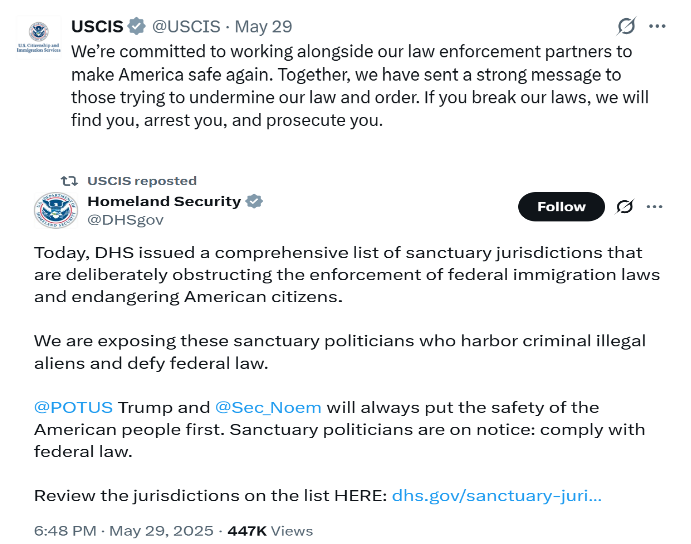Think Immigration: Eroding Trust: USCIS and EOIR’s Role in Trump-Era Immigration Enforcement

Our immigration system is transforming from one that respects the rule of law and due process into one that prioritizes enforcement and spreads fear. ICE now has outsized influence over USCIS and EOIR, two agencies whose mission (at least for now) is to promote fairness and integrity. White House Deputy Chief of Staff Stephen Miller is pushing aggressively to increase enforcement with the aim of 3,000 ICE arrests per day. The administration’s focus on detaining individuals who are attempting to follow the immigration laws, by applying for immigration benefits and appearing for court appearances, raises serious concerns about the fairness and justice.
A simple search of USCIS’ social media reveals significant enforcement-related content:

How did we get here? In 2002, the Homeland Security Act divided the responsibilities of the Immigration and Naturalization Services (INS) into three separate agencies including U.S. Citizenship and Immigration Services, whose name reflects its mandate to provide immigration services and administer the system. The statute distinguished these responsibilities from the enforcement authorities granted to the Customs and Border Protection (CBP) and Immigration and Customs Enforcement (ICE). USCIS was charged with assisting individuals with their immigration and naturalization needs. The USCIS Mission Statement from the 2023-2026 Strategic Plan states, “USCIS upholds America’s promise as a nation of welcome and possibility with fairness, integrity, and respect for all we serve.” Its current posture and actions, including terminating asylum-seekers' cases to place potential asylees in expedited removal proceedings, contravene its mission. Further, shifting its focus towards enforcement sets a dangerous precedent that will discourage many from interacting with the agency and impact communities, families, and businesses.
AILA has received reports of ICE arresting people at USCIS field offices nationwide. These arrests are primarily taking place before, during, or following an I-130 or adjustment of status interview. By our analysis, it appears ICE officers are targeting people who could be found inadmissible but could also nonetheless be found eligible for legal relief and are in fact going through the legally prescribed method of applying for it.
For instance, individuals have been arrested with no criminal record and with pending applications, but who had in absentia removal orders -- that importantly would not preclude grant of their application. Reports also indicate arrests of those who entered without inspection (EWI), despite qualifying for an I-601A waiver to be filed after their I-130 interview. Individuals with visa overstays and terminations, prior convictions, and prior arrests with no convictions have all been arrested at USCIS. Of even greater concern, one report described an arrest based on suspicion, not confirmation, of gang membership. In this case, police included the allegation in a report nearly a decade ago and there is no conviction of a crime.
Not only is USCIS shifting radically into an enforcement agency but so are the courts. Starting in May 2025, advocates started reporting that clients who showed up for their court hearings were having their cases dismissed and were then being detained by ICE upon departing the courtroom. The Trump Administration was executing a nationwide strategy: Multiple agencies under ICE’s apparent direction were targeting individuals who they believed could be deported under “expedited removal” and were requesting that judges dismiss these cases, citing changed circumstances on the part of the government. Setting the stage for these actions, in a January 20 memo, ICE rescinded their enforcement policy that previously protected court houses and other spaces from enforcement actions. Shortly after this change, the Executive Office of Immigration Review (EOIR) also issued a policy memorandum which reversed the longstanding policy against allowing ICE enforcement actions at immigration courts.
AILA chapters in multiple jurisdictions began to observe the court actions and fight back against what was becoming increasingly apparent: the courts were depriving people of a fair process and their day in court. Attorneys began insisting that the courts provide due process and an opportunity to be heard before dismissing people’s cases. As some immigration judges began to deny or delay ruling on these motions to dismiss, reports indicated that in some places, ICE arrested noncitizens regardless of the outcome of their hearing. This included individuals who had children, pending applications for relief, and often no criminal history to speak of. These were individuals doing exactly what they were supposed to do: following the law and appearing for the scheduled court hearing.
The wave of enforcement at USCIS and the courts has created fear in noncitizens who want to comply with the law and do everything the so-called “right way.” They are filing immigration applications and showing up for court hearings and simply asking for a fair forum in which to plead their case. This improper bias toward on enforcement by the immigration courts and USCIS will discourage individuals from showing up to court hearings and interviews. They will be forced into the shadows, rather than pursing relief with the government. Contrary to U.S. law, the Trump administration is effectively communicating that even when someone does everything right, they will still be denied the legal relief to which they may be entitled, then imprisoned and finally deported. These practices will discourage eligible immigrants from pursuing legal pathways and will further destabilize American communities.
When we punish individuals who are doing what the U.S. government is asking of them, by appearing for scheduled interviews and hearings, the administration is robbing them of due process, something that has stood as a bedrock of U.S. jurisprudence and principles.
AILA is monitoring these enforcement actions and asks its members to do two important things: Take Action by contacting Congress, and report ICE arrests at EOIR, USCIS field offices, Application Support Centers, or Asylum Offices via the following calls for examples:
